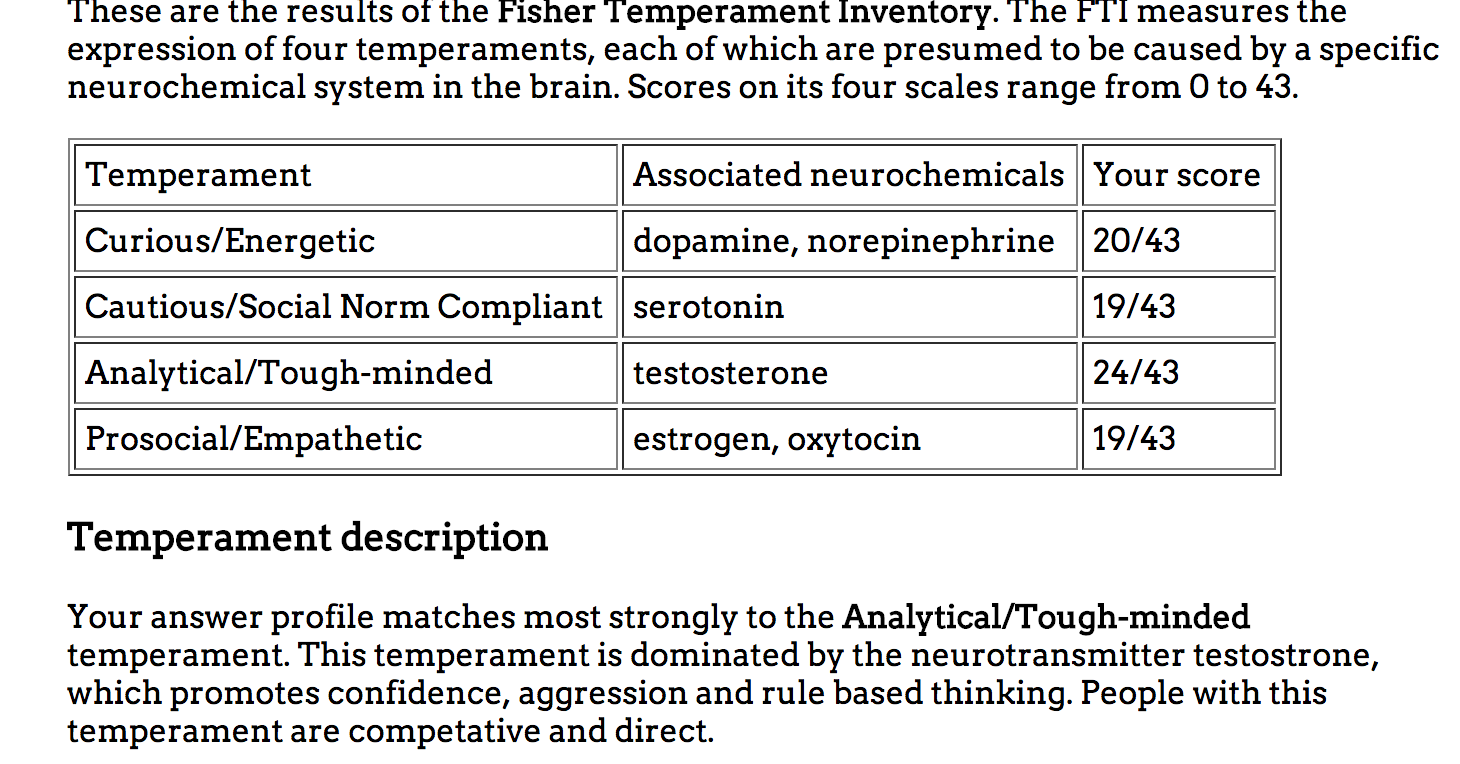I think perhaps I can clear some things up for you. The test is simplistic, but the bulk of the research done that Helen Fischer based her personality types on is standard well documented research the fields of affective neuroscience, evolutionary psychology, and anthropology. Now, of course all scientific knowledge is provisional is therefore subject to change and revision as we gain more data, but at this point we know that personality is genetically and environmentally determined to varying degrees, with the strictest estimates being personality is 30% hereditary and looser estimates being 60%, either way these estimates leave much to be desired in explaining why people have the personalities they do. Yet do not conflate personality with temperament. Temperament is what is determined by genetics and the prenatal environment. Personality is the result of a self-organizing process between one's temperament and their developmental environments. I'm going to avoid talking about gender roles and instead focus on some facts about testosterone and estrogen from the vantage point of behavioral genetics and animal evolution. We know that when you increase testosterone in mice, rats, cats, dogs, chimpanzees, and humans their behavior and attitudes change and the same has been observed in hormonal treatment of trans individual, testosterone seems to increase libido, increases object oriented and spatial thinking, and a willingness to be aggressive and compete for status. Because hormones exist across all mammals and many other animals, they have a long interrelated evolutionary history with animal emotions that we don't understand well but does reveal that testosterone is agonistic with other neurotransmitters and hormones, specifically dopamine and norepinephrine which are involved in motor function, reward, goal pursuit, risk taking, and the fight or flight response as well as agonistic or is suppressed by estrogen, progesterone, and oxytocin. We can observe this kind of relationship between estrogen, progesterone, and testosterone in the production of these sex hormones by female ovaries and male testicles as the ovaries produce estrogen, progesterone, and small amounts of testosterone while testicles produce testosterone and synthesizes small amounts of estrogen and progesterone. One might ask, why might this hormonal relationship have evolved across a wide number of mammals including human beings, and the answer just might come down to female members of most mammalian species put greater investment of rearing offspring across mammalian evolutionary history while male members of most mammalian species put greater investment in competing against one another across mammalian evolution and when you look out in nature this pattern tends to hold with most mammals, though there are quite a few exceptions, they're not what's typical. Now, when it comes to primates, hominids, and specifically human beings the story seems to be no different, because women have ovaries, can become pregnant, and have to rear an infant their psychology differs from male psychology, not in all ways, not so much that men and women do not have much in common, but enough for human males and females to serve differing functions in human natural and sexual selection which is why men have more testosterone present in their bodies than women on average about 20 times more, because before there was modernity there was an evolving humanity and this is where Helen Fischer's personality models comes from. These physiological realties will have noticeable effects on psychology, attitude, and behavior. gender norms or no gender norms, social roles or no social roles, because we're not only social cultural animals. However, I think when looking at Fischer's personality scheme that it's best to think of her personality types as possible variants on each MBTI type as its more appropriate to be seen as temperamental realties than explicitly personality ones, because human beings likely only have personality as we're cultural, historical, social animals where most other animals just have a temperament as temperament is more general and basic than personality and is more affectual in its orientation rather than identity oriented, because other animals likely don't have egos and have to fit into a culture like human beings. For instance, dogs and differing dog breeds have differing cluster of temperamental variances, but dogs don't seem to have awareness of their temperamental dispositions and have less diversity in their temperamental realities than humans who literally may evolved to have personalities where dogs have other evolutionary niches like coats, claws, and fangs. There is much variation in human beings, but there is typicality as well, what you may not observe in your observations of 20 people is far more obvious in a sample of 100,000. Now, Certain aspects of personality change overtime and others do not and much what changes overtime with a personality is based on occupation and lifestyle, what you do and how you live consistently, but it's very difficult to change certain things about personality like you can't make yourself less neurotic without a lot of intervention and you will never be the least neurotic person in the world. From a big five standpoint in western European societies including America and Canda, people become more conscientious and agreeable as they age likely due to the demands of existing in western society, changes in hormones, and participating in capitalistic a marketplace. To your point, there is still much the scientific community is not aware of, or did you mean personally not aware of as in each individual?

Hmm... How do you use your builder trait if you don't mind explaining? That is almost maxed out too. Just curious.


